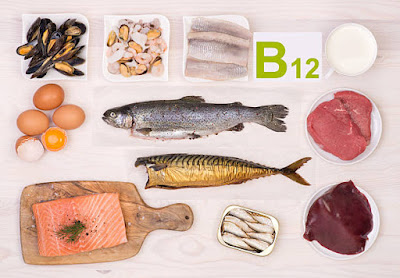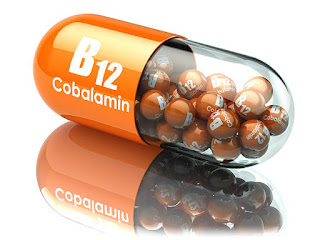Hi, Let's explore some knowledge about the B series last Vitamin which is Vitamin B12 (cobalamin). We'll study the functions, deficiency, toxicity, and more.
Vitamin B12:
It is a water-soluble vitamin and also known as cobalamin. It is one of the eight B vitamins. Vitamin B12 is an essential that a human body needs but cannot produce on its own.
Functions:
- Red Blood Cell Synthesis
- improve mood and outlook
- Amino Acid Metabolism
- DNA synthesis
- Proper Nerve function
B12 is important for energy metabolism.
Metabolic benefits:
- Energy production
- Metabolism of fatty acid and protein
- DNA synthesis
Bioavailability:
Vitamin B12 bioavailability in
humans are dependent on an individual’s gastrointestinal absorption capacity. The absorption of this vitamin is complex and also it has adverse changes with age.
VITAMIN B12 that we consume from foods appear to have a different rate of
absorption with better absorption from chicken and beef as compared to eggs.
Food Sources:
Food that is high is in vitamin B12 includes mostly animal food sources such as lamb, beef, poultry, fish (especially tuna and haddock). Also, food from dairy sources such as yogurt, eggs, milk cheese.
Vitamin B12 Supplements are Cyanocobalamin and Hydroxocobalamin.
Vitamin B12 supplements intake helps in the reduction of the risk of cardiovascular disease. Also, vegetarians should consume vitamin B12 supplements because their food is lacking in Vitamin B12.
Deficiency:
Deficiency is usually caused by the malabsorption of vitamin B12 although
dietary inadequacy is common in the elderly, vegans, or Lactovo vegetarians
with poor diets.
- Depression
- fatigue
- body weakness
- loss of appetite
- significant weight loss
Toxicity:
When a person takes too much vitamin b12 it causes vitamin b12 toxicity
and it results in swelling or diarrhea.
Recent Study:
· Recently,
for maintaining health the interest in the role of vitamins has been increased.
While there is more attention has been focused on vitamin D.
· While
vitamin B12 deficiency can occur secondary to inadequate intake (e.g., some
vegetarians), in older persons, it is due mostly to food-cobalamin mal-absorption
syndrome.
· Both vitamin B12 and folic acid have important and balance functions in the body, it is difficult to determine that vitamin B12 has health benefits in isolation. It shows that intake of Vitamin B12 might help us in preventing neural tube defects and chronic diseases, especially through its role in homocysteine levels.
Diseases Related to Vitamin B12:
- Neural Tube Defect
- Cardiovascular disease
- Osteoporosis
- Aging
- Megaloblastic Anemia




